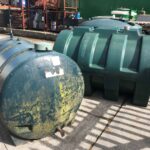
Heating oil is vital in keeping your home and workplace warm during colder months. It’s often stored in large and highly durable tanks. However, these tanks are not immune to wear and tear. Many homeowners and businesses overlook the importance of inspecting and maintaining their heating oil storage tanks. It can lead to costly repairs, environmental hazards, and legal liabilities.
Routine inspections are important not only because they extend the lifespan of storage tanks but for various other reasons as well. In this post, we will go through points that highlight the importance of routine inspections for oil storage tanks.
Why Are Regular Inspections Important for Heating Oil Tanks?
Adherence to Regulations
The first and most significant reason for routine inspections is to comply with heating oil tank regulations. Many countries have strict environmental laws governing the storage and handling of oil. These laws are in place to prevent the contamination of the environment.
During an inspection, certified professionals check that your tank meets all regulatory requirements. Compliance may result in heavy fines, legal action, or forced replacement of the tank. Routine inspections ensure that you stay compliant with all regulations and standards, mitigating the risk of any legal activity against you.
Preventing Leaks and Spills
Over time, heating oil tanks can develop cracks or weak spots due to corrosion. It often happens when they are exposed to harsh weather conditions. These issues can lead to oil leaks or spills. They not only result in costly clean-up but also pose significant environmental risks.
Routine inspections can detect early signs of damage and allow you to take proactive steps to prevent leaks and spills. You can opt for preventative maintenance before a small issue becomes a major problem. It ensures that your tank operates safely and prevents potential damage to your property and the ecosystem.
Environmental Protection
Heating oil leaks are a serious environmental concern. Even small amounts of oil can cause significant contamination. It can be more dangerous when the leak occurs near a water source or on permeable ground. Contaminated soil and groundwater require expensive restoration processes. Regular inspections help prevent such leaks. It ultimately reduces the risk of environmental damage and costly repairs.
Maintaining Efficiency
A well-maintained heating oil tank operates more efficiently than a neglected one. Inspections ensure that the tank is functioning properly. Oil is stored safely in these tanks and delivered effectively to your heating system.
Inspections help detect clogged pipes, corroded components, or other problems that can obstruct oil flow and impact the efficiency of your heating system. As a result, you can take immediate action to fix these problems and control fuel costs.
Early Detection of Corrosion
Corrosion is one of the most common issues faced by heating oil storage tanks. It can be a major concern if they are made from metal. Water can accumulate in the tank over time, causing rust and weakening the structural integrity.
If left unchecked, corrosion can lead to tank failure. Routine inspections are essential for detecting early signs of corrosion. As a result, you can take proactive steps to control it. Addressing it early on can save you from costly repairs or replacements.
Prolong the Tank’s Lifespan
Investing in regular inspections can significantly extend the lifespan of your heating oil storage tank. By identifying and resolving small issues like corrosion, leaks, or worn components, you can prevent more serious problems from developing. In the long run, routine maintenance is far more cost-effective than replacing an entire tank. Regular inspections allow you to get the most out of your investment, ensuring that your tank serves you reliably for years to come.
Prevent Costly Repairs
Routine inspections are a proactive approach to maintenance. It allows you to detect small issues before they escalate into costly repairs. For instance, a small leak might be an easy fix. However, if left unnoticed, it could result in extensive damage to your property and the surrounding environment. Inspections can avoid the costs associated with emergency repairs, clean-up, and even legal penalties.
Proper Disposal of Old Tanks
Over time, heating oil tanks reach the point where repairs and maintenance are no longer effective. It hints that you need to replace it. Routine inspections help determine the right time for heating oil tank disposal.
Avoid Unexpected Disruptions
Heating system failure during the coldest months of the year can lead to unexpected disruptions. An undetected issue with your oil storage tank could lead to this issue. Routine inspections ensure that your heating oil tank remains in good working condition. It prevents unexpected disruptions and provides peace of mind.
Regular tank inspections reduce the risk of costly repairs and unexpected disruptions. Above all, it helps you stay compliant with regulations as well. Therefore, you should contact skilled professionals to inspect them regularly.

